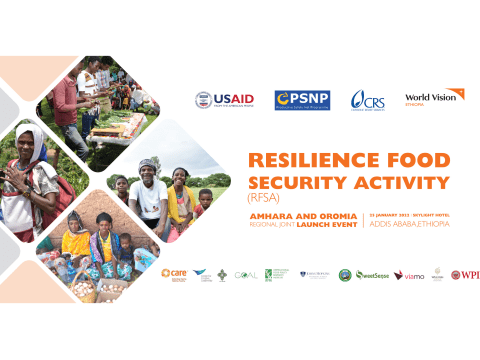World Vision and partners launch Strengthening PSNP Institutions and Resilience Programme

On 25 January 2022, World Vision, along with the Organization to Rehabilitate and Develop Amhara (ORDA), CARE, and the International Food Policy Research Institute (IFRI), launched the Strengthening Productive Safety Net Programme (PSNP) Institutions and Resilience (SPIR II) programme at Sky Light Hotel in Addis Ababa.
In his welcoming remarks at the launch, Mr. Edward Brown, World Vision's National Director for Ethiopia, said, “The United States of America’s government and citizen have always been a strong supporter of World Vision. And the objective of this programme is to make people’s lives better, to empower and capacitate people to take care and feed themselves and their families.”
The US$206 million (over 10 billion Birr) project funded by USAID's Bureau for Humanitarian Assistance (USAID-BHA) is uniquely placed to address the pervasive food and nutrition insecurity that is exacerbated by the poverty of vulnerable PSNP households in the targeted districts of Amhara and Oromia regional states.
Mr. Sean Jones, Mission Director for USAID Ethiopia, on his part said, “There is nothing more important than investing in food and resilience activities at this time in Ethiopia, and we are pleased to be able to mobilise our resources to do that.” He also noted that these activities will continue to build resilience and improve the lives and livelihoods of communities in the two regions.
Mrs. Sintayehu Demissie, Food Security Coordination Directorate Director from the Ministry of Agriculture, asserted that: “The programme is aligned with the objectives of the rural productive safety net programme which focuses its efforts to improve the livelihoods of the poor and vulnerable people of Ethiopia. Therefore, for the effective implementation of the programme, it's very crucial to have strong collaboration between the government, implementing partners, and other stakeholders.”
The five-year programme (2021-2026) has targeted to benefit more than 400,000 people in the two regions. It will also create a strong and shock-responsive ecosystem and support vulnerable communities to graduate from poverty and sustain income and food security gains.
More than 80 people from national and international implementing partners, representatives from government bureaus, and other distinguished guests attended the event.